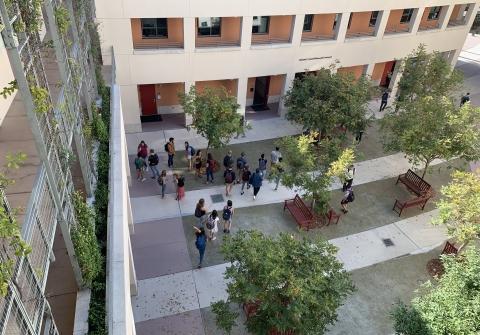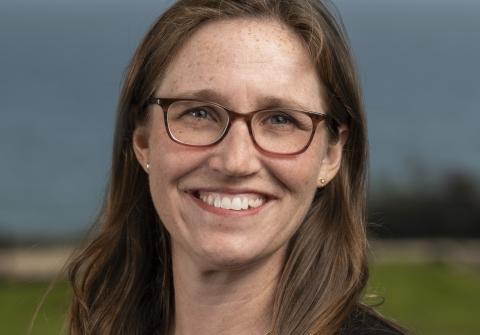Bren School Diversity Statement
The Bren School’s mission is to solve environmental problems through research and training the next generation of environmental leaders. We value the diversity of views, expertise, opinions, cultures, backgrounds, customs, and experiences reflected among faculty, staff, researchers, students and visitors, and are committed to providing a safe, productive and welcoming environment for everyone in our community. We know that to bring just solutions to the world’s critical environmental problems, such as climate change, conservation, and pollution, we need all voices and perspectives.
The Bren School recognizes the role that academic institutions and environmental organizations have played in perpetuating inequality and racism. We recognize that these historic trends have also laid the foundation for modern-day inequalities and discrimination, particularly unequal access to and representation in professional organizations, careers, and the wider field of environmental science.
At the Bren School, we believe that we must actively work for access and representation in the environmental field. We also recognize the important role that academic institutions play in presenting and teaching an inclusive vision of the field of environmental science and management.
The Bren School's ultimate goal is to be a vibrant, inclusive, and respectful community where the diverse perspectives of our students, staff, and faculty amplifies our ability to identify and solve environmental problems by:
- Becoming a leader in training diverse environmental professionals,
- Actively recruiting, supporting, and retaining diverse students, staff, faculty, and visiting scholars,
- Developing a welcoming environment so that everyone feels supported, represented, and included at Bren and the wider UCSB community,
- Conducting research that assesses the ways that environmental risks are distributed,
- Teaching an inclusive and representative picture of the field of environmental science and management.

Bren Community Values
Inclusive of and adapted from the UC Santa Barbara Principles of Community
The Bren School of Environmental Science & Management at UC Santa Barbara affirms the intrinsic dignity and value in each of us. We believe in every individual’s right to freedom of expression, including the ability to disagree with and/or counter another’s point of view, and we hold one another accountable to the highest standards of civility, respect, and decency in all of our interactions. We do not tolerate acts of bias, bigotry, harassment, or other harm to individuals by anyone in our community on the basis of race, color, ethnicity, sexual orientation, gender, gender identity, age, physical or mental ability, size, language, religious beliefs, political affiliation, service in the uniformed services, citizenship, pregnancy, medical condition, genetic information, ancestry, marital status, or national origin among other personal characteristics. We affirm that the responsibility for opposing such behavior lies with all members of the community whenever they encounter such behavior. We celebrate our differences and recognize and honor diversity as vital to the excellence of our community and institutions.
Expected Behavior
In support of our commitment to creating and supporting a diverse, inclusive and welcoming community, we expect all community members, residents and visitors alike, to uphold the following expectations about behavior:
- Treat all members of and visitors at the Bren School with kindness, respect and consideration, valuing a diversity of views and opinions (including those you may not share).
- Communicate openly, with respect for all others, critiquing ideas rather than individuals.
- Refrain from demeaning, discriminatory, or harassing behavior and speech directed toward others.
- Be mindful of your surroundings and those around you.
- Respect people’s boundaries.
- Be considerate in your interactions with others and careful about the words you use. Consider if the language that you’re using can be perceived as discriminatory.
- Be mindful of how much time and space you take up. Be aware of the dynamics of power, and whether you may be taking advantage of it.
Strategic Plan for Diversity, Equity, and Inclusion
In Fall 2019, the Bren School began developing a strategic action plan for diversity, equity, and inclusion. This action plan recognizes that recruitment and retention of diverse students, faculty, and staff requires fostering a supportive and welcoming environment, that environmental solutions require an environmental justice lens, and that true excellence in research, teaching, and service requires a culture of inclusion.
Some elements of the strategic plan will institutionalize well-established practices of the Bren School; others were new ideas. In Fall 2023 we began the process of updating the strategic action plan, recognizing that each action we take is a step in a continuous process of improvement, feedback, evaluation, reflection, and progress, and that new opportunities and needs arise over time.
Read the most recent iteration of our Strategic Plan and learn more about Bren’s strategic planning process.

Bren Diversity Committee
The mission of the Bren Diversity Committee is to identify and support diversity, equity, and inclusion objectives for the School. The Diversity Committee is responsible for soliciting and incorporating community feedback into their priorities each year, to provide recommendations for School administration, and to pursue objectives that foster an inclusive, diverse community. The committee is composed of Bren School faculty, staff, and students. Positions are held for an academic year, though many faculty, staff, and student representatives serve for longer.

Associate Dean of Diversity, Equity, and Inclusion
In 2019, Dean Steve Gaines appointed Professor Sarah Anderson as the inaugural Associate Dean of Diversity, Equity and Inclusion for the Bren School of Environmental Science & Management. Dr. Anderson leads efforts to ensure that research, teaching, and service at the Bren School involves and empowers all communities. Her initiatives include faculty search committee trainings on reducing bias in search practices, developing Bren's Strategic Plan for Diversity, Equity, and Inclusion, and supporting student engagement in environmental justice.
Support, Safety, and Resources
The Bren School aims to be a supportive and inclusive community with no tolerance for bias, harassment, or violence. We have provided a list of trusted contacts within the Bren School, as well as an extensive guide to resources for reporting incidents, including: sexual violence, harassment, and discrimination; hate crimes, hate incidents, and bias; microaggession incidents; and zoombombing incidents.
Holistic and Inclusive Admissions
The Bren School aims to provide an intellectually rich, socially just, and equitable educational environment. Together with the California Consortium for Inclusive Doctoral Education (C-CIDE), we have been leading the UCSB campus in developing strategies for recruiting, admitting, and mentoring graduate students from diverse backgrounds.
We have adopted a holistic admissions review process to help counter implicit bias, expanded recruitment efforts at institutions that serve under-represented students, and conducted yearly climate surveys to uncover and understand problems. Academic, financial, and community support for diverse students is as important as recruitment and admissions. In addition to donor support, the Bren School directs financial aid from professional degree supplemental tuition (PDST) to support students who might not otherwise be able to attend. We invest in trainings on mutual respect, inclusive classrooms, and supporting students and colleagues with different backgrounds and experiences.
Explore holistic admissions for:
Learn more about our students by visiting our Bren Student Data Explorer
This interactive dashboard visualizes admissions and career outcome data of current Bren students and recent alumni. It includes demographics of all Bren students and career outcomes for Master’s students.
Visit the UCSB Graduate Statistics webpage for campuswide student data
Find information on aspects of the student life cycle, ranging from applications and admissions to employment outcomes upon graduation across all UCSB graduate programs including Bren Masters and PhD programs. Use the filters to view data for various years, programs, and objectives.
Our Commitment
We are committed to building a staff and faculty that is reflective of and responsive to the demographics of California and our students. Knowledge of diverse perspectives, methodological assumptions, traditions of training, and racial and cultural backgrounds facilitates problem-solving, creativity, innovative scholarship, and effective teaching. We know that good environmental problem solving requires not just equitable faculty search processes, but also disciplinary expansiveness, resources to support faculty, and building a pipeline of PhD graduates with varied backgrounds and interdisciplinary training.
Opportunities to Engage
Bren students have been a resonant voice of positive change, not just in the sectors they eventually work in or the causes they back, but here at the Bren School and on our UCSB campus. The role of Bren leadership is to listen, educate ourselves, build viable strategies, and enact those strategies in a timely and effective way. We value student feedback in our pursuit of inclusive excellence and in everything we do. At the Bren School, students have opportunities to become involved in governance. Most Bren committees, including the Diversity Committee, the Masters Curriculum Committee, and the PhD Program Committee, have one or more student representatives. Students themselves run the Bren Seminar Committee and the PhD Dean’s Advisory Committee. In these roles, they contribute their voices to governance and problem-solving.

Environmental Justice
Environmental justice is a critical element of the solutions Bren students and researchers are developing and our core curriculum includes a course on environmental justice. This course imparts skills to enable students to analyze the distribution of environmental consequences and to find ways to reduce harms.
We directly research and solve problems at the intersection of human and environmental systems through Bren student Group Projects. Via Master's Group Projects, students have helped agencies in resource-poor countries enact sustainable fishing practices while maintaining economic viability for small fisheries the communities depend upon. They have evaluated how to balance ecosystem degradation and agriculture in rural Rwanda, and tracked the correlation between air pollution and diabetes in low income, marginalized communities. Group projects have also identified how Caribbean economies can preserve reef ecosystems in balance with tourism income, or how climate change has impacted the water reservoirs for Santa Barbara County.
Bren students organize an Environmental Justice Club, which hosts an annual Environmental Justice Symposium that showcases research from Bren and beyond, advises Group Projects on incorporating environmental justice, and offers field learning opportunities.
Submit Comments and Suggestions
You can help the Bren School make change and address concerns by clearly identifying problems and suggesting changes. Please submit comments, concerns, and suggestions to the Bren School Online Suggestion Box. This suggestion box form is reviewed regularly by Bren staff; we encourage you to submit your name so we can follow up, but you have the option to remain anonymous.
If you are a student and would like your comments to go directly to student representatives only, please submit to the Anonymous Suggestion Box. Student representatives will relay the information to the Diversity Committee.